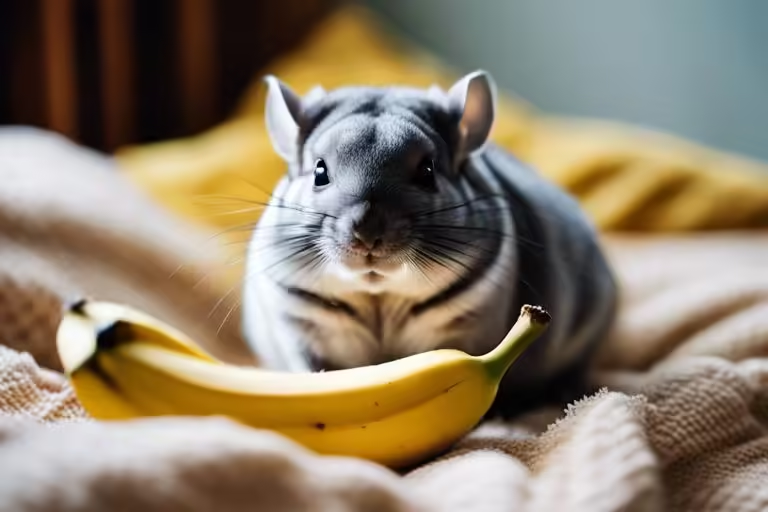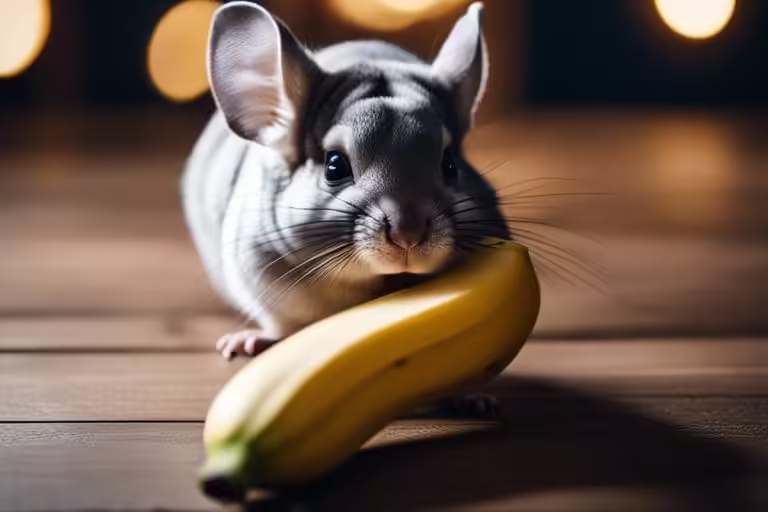No, chinchillas cannot eat bananas. Bananas are high in sugar and low in fiber, making them unsuitable for chinchillas’ sensitive digestive systems. Feeding bananas to chinchillas can cause digestive issues, obesity, and other health problems. Instead, prioritize a high-fiber diet of hay and pellets to keep your pet healthy and happy.
Key Takeaways
- Bananas are unsafe for chinchillas: High sugar content and low fiber make bananas unsuitable for their dietary needs.
- Digestive risks: Bananas can lead to diarrhea, bloating, and other gastrointestinal issues.
- Safer alternatives: Offer chinchilla-safe fruits like apples or blueberries in small amounts and as occasional treats.

Why Bananas Are Not Suitable for Chinchillas
High Sugar and Calorie Content
Bananas contain approximately 12 grams of sugar per 100 grams and are calorie-dense compared to chinchilla-safe foods. This excess sugar can:
- Disrupt gut bacteria.
- Lead to obesity and dental problems.
- Cause spikes in blood sugar levels, increasing long-term health risks.
Low Fiber Content
Chinchillas rely on a high-fiber diet to maintain their digestive health. While bananas contain 2.6 grams of fiber per 100 grams, this is insufficient compared to the fiber content in hay or leafy greens.
Chinchillas’ Unique Dietary Needs
High-Fiber, Low-Sugar Diet
Chinchillas have evolved to consume a diet rich in fiber and low in sugar. Their digestive system depends on:
- Hay (e.g., timothy hay): Provides essential fiber to maintain gut health and prevent dental overgrowth.
- Chinchilla-specific pellets: Formulated to meet their nutritional needs, offering balanced protein, fiber, and vitamins.
Digestive Sensitivity
Chinchillas’ large cecum houses gut bacteria that help break down fiber-rich foods. Feeding starch- and sugar-rich foods like bananas disrupts this balance, leading to issues such as:
- Bloating
- Diarrhea
- Lethargy
Potential Risks of Feeding Bananas
| Risk | Cause | Outcome |
|---|---|---|
| Digestive upset | High sugar and starch content | Diarrhea, bloating, gas |
| Obesity | Excess calories and sugar | Weight gain, heart stress |
| Nutritional imbalance | Low fiber, lack of essential nutrients | Weak digestion, tooth overgrowth |
Safe Alternatives to Bananas
If you want to add variety to your chinchilla’s diet, consider these safe and healthy treats:
| Food | Suitability | Frequency |
|---|---|---|
| Apple slices | High in fiber, low sugar (seedless) | Once a week |
| Blueberries | Rich in antioxidants (in small amounts) | Once a week |
| Dried herbs | Low sugar, supports digestion | 2–3 times a week |
| Hay-based treats | Nutrient-rich, supports dental health | As needed |
Always introduce new foods gradually and monitor your chinchilla for signs of digestive distress.
Creating a Balanced Diet for Your Chinchilla
To ensure your chinchilla thrives:
- Prioritize hay: Make hay 80% of their daily intake.
- Add pellets: Use chinchilla-specific pellets for balanced nutrition.
- Offer safe treats: Use fruits like apples or berries sparingly (no more than 10% of their weekly diet).
- Ensure hydration: Provide fresh, clean water daily.
Final Words
While bananas are a healthy snack for humans, they are unsuitable for chinchillas due to their high sugar and low fiber content. Feeding bananas to chinchillas can cause serious health issues, including digestive upset and obesity. Instead, stick to a balanced diet of hay, pellets, and safe, chinchilla-approved treats like apple slices or blueberries.
By making informed dietary choices, you can ensure your chinchilla stays healthy, happy, and thriving for years to come.
Frequently Asked Questions
Q: Can chinchillas eat bananas as an occasional treat?
A: No, bananas are not recommended, even occasionally. Their high sugar and low fiber content can disrupt your chinchilla’s sensitive digestive system.
Q: Why are bananas harmful to chinchillas?
A: Bananas are high in sugar and starch, which chinchillas cannot digest efficiently. This can lead to bloating, diarrhea, and obesity.
Q: What fruits are safe for chinchillas?
A: Safe fruits include apple slices (seedless), blueberries, and strawberries, given sparingly and in small amounts.
Q: Can banana peels or leaves be fed to chinchillas?
A: No, banana peels and leaves can be harmful. They may contain pesticides or other toxins and offer no nutritional benefit for chinchillas.
Q: How do I know if a treat is safe for my chinchilla?
A: Consult your veterinarian or use reliable chinchilla care guides. Safe treats should be low in sugar, high in fiber, and free from pesticides or additives
Can Chinchillas Eat Dried Bananas?
A: No, Dried bananas are high in sugar and low in fiber, making them a problematic treat for chinchillas.
